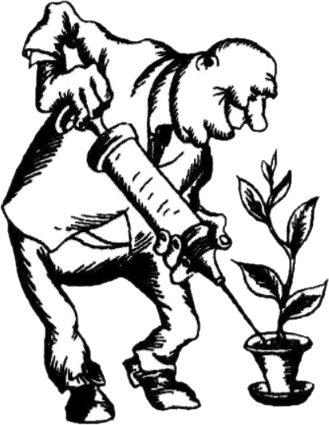107Stories About ChemistryINDEX |
101.
What Plants Eat and What Chemistry Has to Do With It
Even in ancient times there were cooks who were famed for their culinary achievements. The tables of royal palaces were heaped with all kinds of dainty dishes. Well-to-do people became particular about their food. It would seem that plants were not so particular. Herbs and bushes have survived in hot deserts and in the polar tundra. They may be stunted and wretched to look at, but they have survived. There was something they needed for their development, but what? Scientists sought this mysterious �something� for many years.  Despite all their experiments, in spite of all their discussions nothing definite was found. The answer was finally supplied in the middle of the last century by the famous German chemist Justus von Liebig. He was aided by chemical analysis. He �resolved� a great variety of plants into their separate chemical elements. At the outset there were not so many of them, ten in all: carbon and hydrogen, oxygen and nitrogen, calcium and potassium, phosphorus and sulphur, magnesium and iron. But these ten elements gave rise to the vast ocean of foliage on Earth. It followed therefore that for plants to stay alive they had somehow to assimilate, to �eat� these elements. But how? Where are the food stores of plants? Obviously, in the soil, in the water, and in the air. There were some strange things, however, that had to be explained. In some soils a plant might develop rapidly, blossom, and bear fruit, whereas in others it would droop, wither and turn into a sickly freak. Evidently the latter soils lacked some element. Even before Liebig men knew that if the same agricultural crops were sown year after year on even the most fertile soil, harvests would become worse and worse. The soil became impoverished The plants gradually �ate up� all the chemical elements in it that they needed. The soil had to be �fed�, that is, the supply of substances removed from it had to be replenished. In other words, it had to be fertilized, as we usually say. Fertilizers were used way back in hoary antiquity. They were introduced into the soil intuitively, on the basis of experience handed down from generation to generation. Liebig raised the use of fertilizers to the rank of a science and this science was named agrochemistry. Chemistry became servant to plant growing. It was confronted with the tasks of teaching people the right way to use known fertilizers and of inventing new ones. Dozens of different fertilizers are known today. The most important of them are potassium, nitrogenous, and phosphate fertilizers, because potassium, nitrogen and phosphorus are the elements without which not a single plant can grow. |





